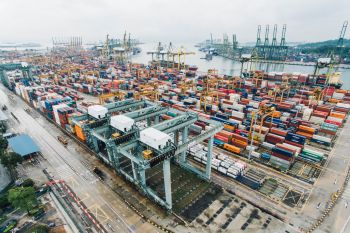
Policymakers should resist the urge to make knee-jerk and wholesale changes to supply chains and global trade policy in the wake of the Covid-19 pandemic, an economist with the UK Trade Policy Observatory has warned.
Professor Michael Gasiorek, a trade policy expert at the University of Sussex Business School, is advising governments against making trade policy responses to the Coronavirus crisis which could have longer-lasting and potentially negative implications in the post-pandemic future for the global trading system.
UKTPO member Prof Gasiorek said it would be difficult to build resilience into supply chains that would be capable of responding to the scale of the impact caused by Coronavirus or future pandemics.
Prof Gasiorek said: "In the face of the shock that we have been experiencing, there are very few supply chains that are resilient to this. The shock is so extreme, so synchronised and affecting supply and demand, it's hard to imagine any supply chain that could be resilient to that.
"If you can't produce a good because you have to maintain social distancing and you can't have production facility operating then no amount of supply chain diversification is going to help there. One way of building more resilience is potentially through the stockpiling of essential goods. Clearly many countries, including the UK did not do enough of that or did not stockpile the right types of goods that were needed in the face of the Covid crisis."
Prof Gasiorek was speaking on the latest episode UKTPO podcast Trade Bites which will be released later today.
Allie Renison, Head of EU & Trade Policy at the Institute of Directors, and Simon Evenett, of Global Trade Alert, joined Prof Gasiorek and regular host Chris Horseman, Deputy Editor of Borderlex, to discuss whether the global trade system was immune to the COVID-19 pandemic.
Prof Gasiorek recommended that where policy changes could be made in response to the global challenges created by Covid-19, new systems were needed to counteract the practice of countries placing trade restrictions on essential medical goods which created shortfalls in life-saving equipment in the time of greatest need.
He also added the world had seen the extreme importance of maintaining the flow of goods and services and ways had to be found in the future to encourage as much trade facilitation as possible in the face of a crisis through the use of technology and by limiting costs and barriers to trade.
He added: "It is very easy to engage in protectionist trade policy responses in the face of the crisis but which then become long-lasting and enduring afterwards. One must think very, very carefully about the type of responses one does in immediate face of a crisis.
"At the moment, we don't yet know how the international trading system is going to respond to the challenges of Covid as we emerge from the lockdown scenarios. It's important to remember that the crisis is not primarily a trade crisis, the crisis is primarily a collapse of supply and a collapse in demand which then impacts on trade.
"There will be a lot of pressure on governments to resort to various forms of policies which impact on trade flows. These might be various forms of export incentives it might be by national policies. Time will tell how governments have responded and how well the global trading system and how well the WTO respond to those."






